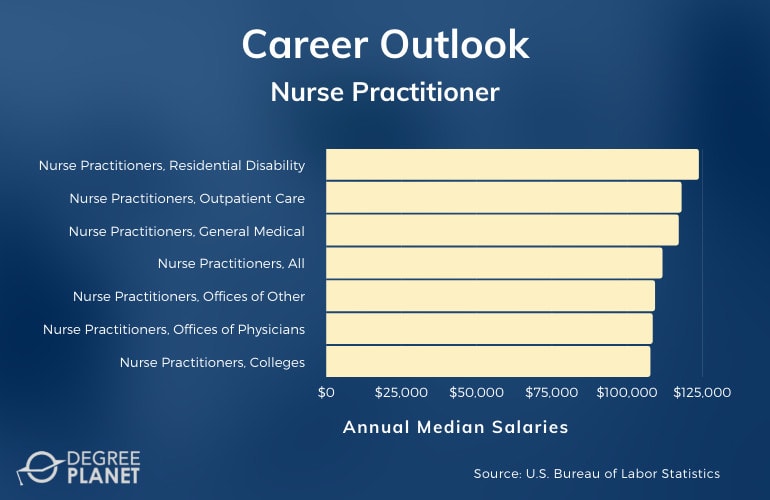What does a nurse practitioner do? While nurse practitioners perform many kinds of tasks as part of their work, their main job is to help patients get and stay healthy.

Healthcare is currently a rapidly growing field, so now may be a strategic time to consider becoming a nurse practitioner.
Editorial Listing ShortCode:
A career as an NP can be very rewarding, as it allows you to exercise your problem-solving skills and help others in a very direct and observable way.
What Does a Nurse Practitioner Do?

A nurse practitioner (NP) may have many different duties. Nurse practitioners can order medical tests and interpret the results, provide patients with assessments and diagnoses, and prescribe medications.
They may also be responsible for administrative tasks, such as keeping accurate medical records for patients. Nurse practitioners often work under the supervision of licensed physicians, and they can collaborate and work on teams with a variety of other medical and allied health professionals.
Editorial Listing ShortCode:
The exact scope of a nurse practitioner’s work can vary from state to state and even from hospital to hospital. Nurse practitioners typically work for hospitals, outpatient care centers, offices of physicians, and offices of other healthcare practitioners. Many also work in educational services. A nurse practitioner can serve as a patient’s primary care provider, which is a key difference between a nurse practitioner and a registered nurse.
Working as an NP involves having detailed knowledge of human anatomy and physiology, different types of illnesses and injuries, and different types of medical tests and treatments. Additionally, the job also tends to involve the use of soft skills, such as interpersonal, communication, and leadership skills.
Common Nurse Practitioner Specializations

Many nurse practitioners have a specialization of some kind. Here are some common ones:
- Family Health. A family nurse practitioner (FNP) works in family health. An FNP usually works in a regular physician’s office, where patients receive physical examinations and other routine care. An FNP may work with patients of all ages with a wide variety of medical conditions.
- Oncology. A certified nurse practitioner in the field of oncology provides care and treatment to cancer patients.
- Pediatric and Child Health. Nurse practitioners in the pediatric and child health sector work with patients under the age of 21, often specifically with infants and toddlers. They can also educate parents on how to keep their children healthy.
- Women’s Health. This specialization usually involves working with obstetricians or gynecologists to provide care that’s specific to women, such as care during pregnancy.
- Psychiatric and Mental Health. In this specialization, a nurse practitioner works with patients who have been diagnosed with mental disorders to help them manage symptoms, adjust medications, and so forth.
There are many different specializations you could choose from when planning a career as a nurse practitioner.
Nurse Practitioner Careers & Salaries

According to the Bureau of Labor Statistics, here are the median annual salaries for nurse practitioners and related professionals.
| Careers | Annual Median Salaries |
| Nurse Practitioners — Outpatient Care Centers |
$128,190 |
| Nurse Practitioners — Residential Mental Health and Substance Abuse Facilities | $126,443 |
| Nurse Practitioners — General Medical and Surgical Hospitals | $124,196 |
| Nurse Practitioners — Offices of Physicians | $121,280 |
| Nurse Practitioners, All | $120,680 |
| Nurse Practitioners — Offices of Other Health Practitioners | $104,790 |
| Nurse Practitioners — Colleges, Universities, and Professional Schools | $101,857 |
| Medical and Health Services Managers | $101,340 |
| Registered Nurses |
$77,600 |
| Nursing Instructors and Teachers, Postsecondary | $77,440 |
The most common industries in which nurse practitioners are employed include hospitals, outpatient care centers, offices of physicians, offices of other health practitioners, and educational services.
Nurse practitioners can have many different types of work environments. For instance, a family practice nurse practitioner at a physician’s office might work regular daytime hours, while a nurse practitioner at a hospital may work night shifts.
How to Become a Nurse Practitioner

Here are some common steps you may take to become a nurse practitioner:
- Earn your BS in Nursing and become a registered nurse. While licensed RNs can hold just an associates, a BSN can help you qualify for graduate school.
- Gain work experience. It is possible to go straight from a BSN to graduate school, but many nurses want to gain real-world experience in an entry-level position before continuing their education.
- Earn a graduate degree in nursing. You can pursue either a Master of Science in Nursing (MSN) or a Doctor of Nursing Practice (DNP) with a nurse practitioner concentration. There are also RN to MSN programs for registered nurses who have not already earned a bachelor’s degree.
- Become licensed as a nurse practitioner. Licensure requirements vary by state.
- Maintain continuing education. It’s necessary to periodically renew your license and keep your skills up to date through continuing education.
Nurse practitioners have a high level of education and experience.
Nurse Practitioner Licensure and Certifications

Licensure requirements for advanced practice registered nurses (APRNs) vary by state. They typically involve earning licensure as a registered nurse, earning at least a master’s degree in nursing, and passing an exam from the nursing board in the state where your wish to practice.
Some universities may require applicants to have a BSN in order to be accepted into an MSN degree program. If you have an RN but no BSN, a growing number of universities offer online accelerated RN to BSN programs that you may be interested in.
While there is a national exam, the NCLEX exam, for RN licensure, exams to become an APRN can differ in every state. This also causes APRN licenses to not transfer as easily between states as RN licenses. Before enrolling in an MSN or DNP program, it’s strategic to make sure it can prepare you for licensure in your state.
In addition to general licensure as a general nurse practitioner, you can also pursue certifications in a variety of specialties. Specialties include oncology, pediatrics, geriatrics, acute care, orthopedics, and many more.
What Is a Nurse Practitioner?

A nurse practitioner (NP) is a type of advanced practice registered nurse (APRN) and has medical training beyond that of a registered nurse. NPs can also train to work in a specialty area, such as pediatric health or mental health.
Nurse practitioner responsibilities can include tasks that might normally only be performed by a physician, such as diagnosing illnesses and prescribing medications. Nurses often have more experience providing hands-on care to patients than physicians. As a result, NPs may be able to provide a different perspective when assessing patients and planning treatment options.
What Skills Do You Need to Be a Nurse Practitioner?
Nurse practitioners have advanced nursing skills. Prospective nurse practitioners learn how to:
- Check vital signs and identify potential causes of abnormalities
- Perform a variety of patient care procedures
- Prescribe diagnostic tests for different conditions
- Use computers and other technology to store patient information securely
- Communicate well with patients and their families
Nurse practitioners also have knowledge of medications and side effects. Exactly what skills you need to be a nurse practitioner depend on your chosen specialization and what type of job you want to have.
What Can a Nurse Practitioner Do?

The duties of a nurse practitioner can include:
- Maintaining patient records
- Recommending diagnostic tests and interpreting the results
- Helping to create treatment plans for patients
- Supervising nurses and other medical staff in an office or hospital
In some states, nurse practitioners work only under the supervision of licensed physicians, while other states allow NPs to practice independently. So, in some situations, while a nurse practitioner can provide diagnoses or prescriptions, they may need a supervising physician to sign off on their work.
How Long Does It Take to Become a Nurse Practitioner?

Becoming a nurse practitioner can take anywhere from 3 to 8 years, depending on your previous education and experience.
For instance, if you already have a nursing license and a Bachelor of Science in Nursing (BSN), you could potentially become a nurse practitioner in a few years. If you are not an RN and are at the beginning of planning your nursing education, you may want to plan on spending around 6 years of full-time studies earning both your BSN and your MSN. There are some programs, though, that can enable you to earn both degrees at a faster pace.
Your timeframe will also depend on whether you want to earn a Doctor of Nursing Practice (DNP) or a Master of Science in Nursing (MSN). While either degree can typically help you qualify to become an NP, earning a DNP will often take more time to complete than an MSN.
Getting Your Nurse Practitioner Degree Online

If you want to develop specialized skills and advance your career opportunities in the field of nursing, becoming a licensed nurse practitioner may be the right path for you.
There are many options available for earning either MSN or DNP degrees. In some cases, you can complete all of your academic coursework online, allowing you to balance your studies with work and other responsibilities. Because nursing professionals often have busy schedules, an online format can be useful for providing flexibility and convenience.
If you’re ready to receive advanced training in this lucrative field, you can start exploring accredited universities today to find the nurse practitioner program that best aligns with your career goals.

